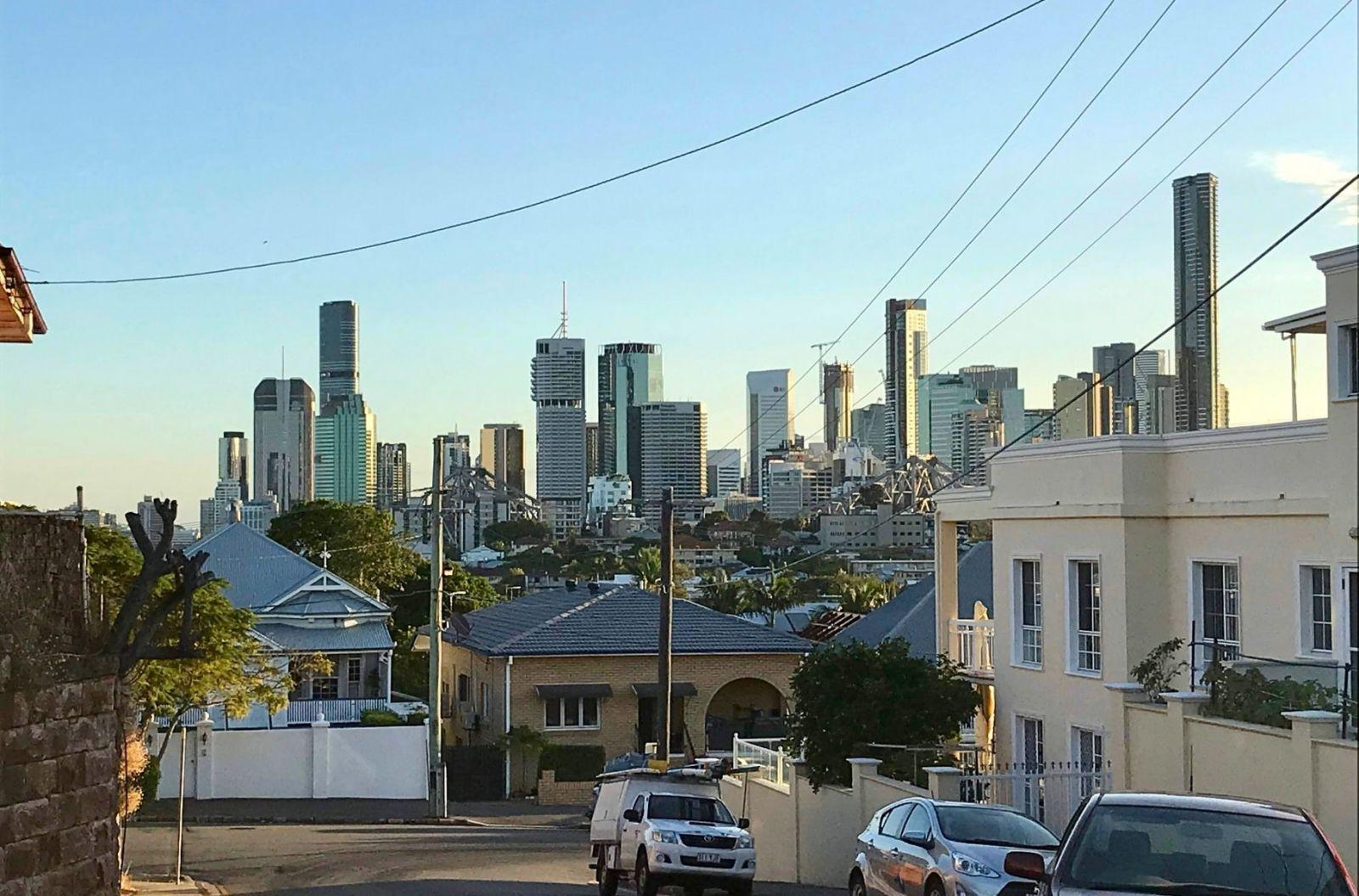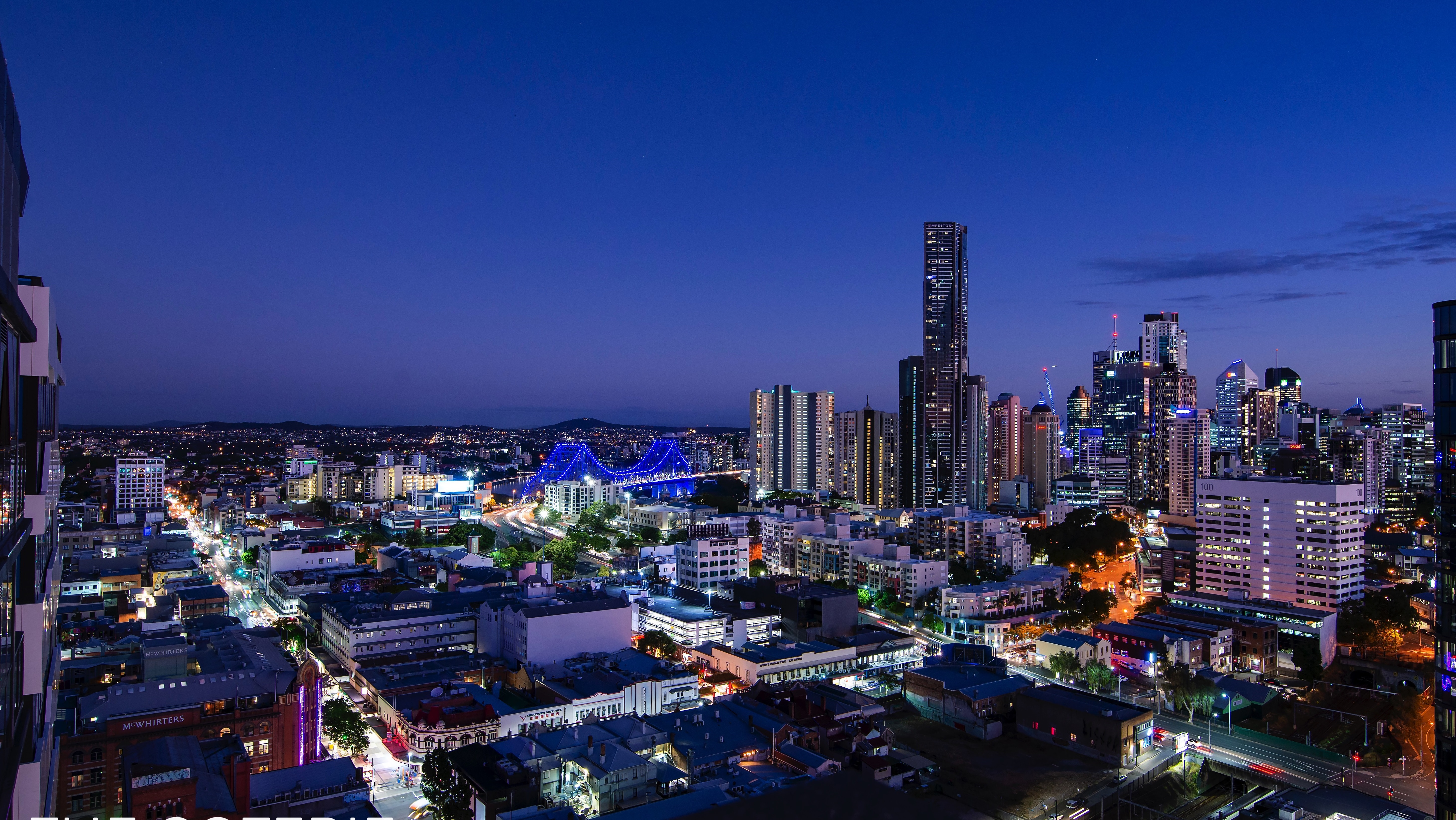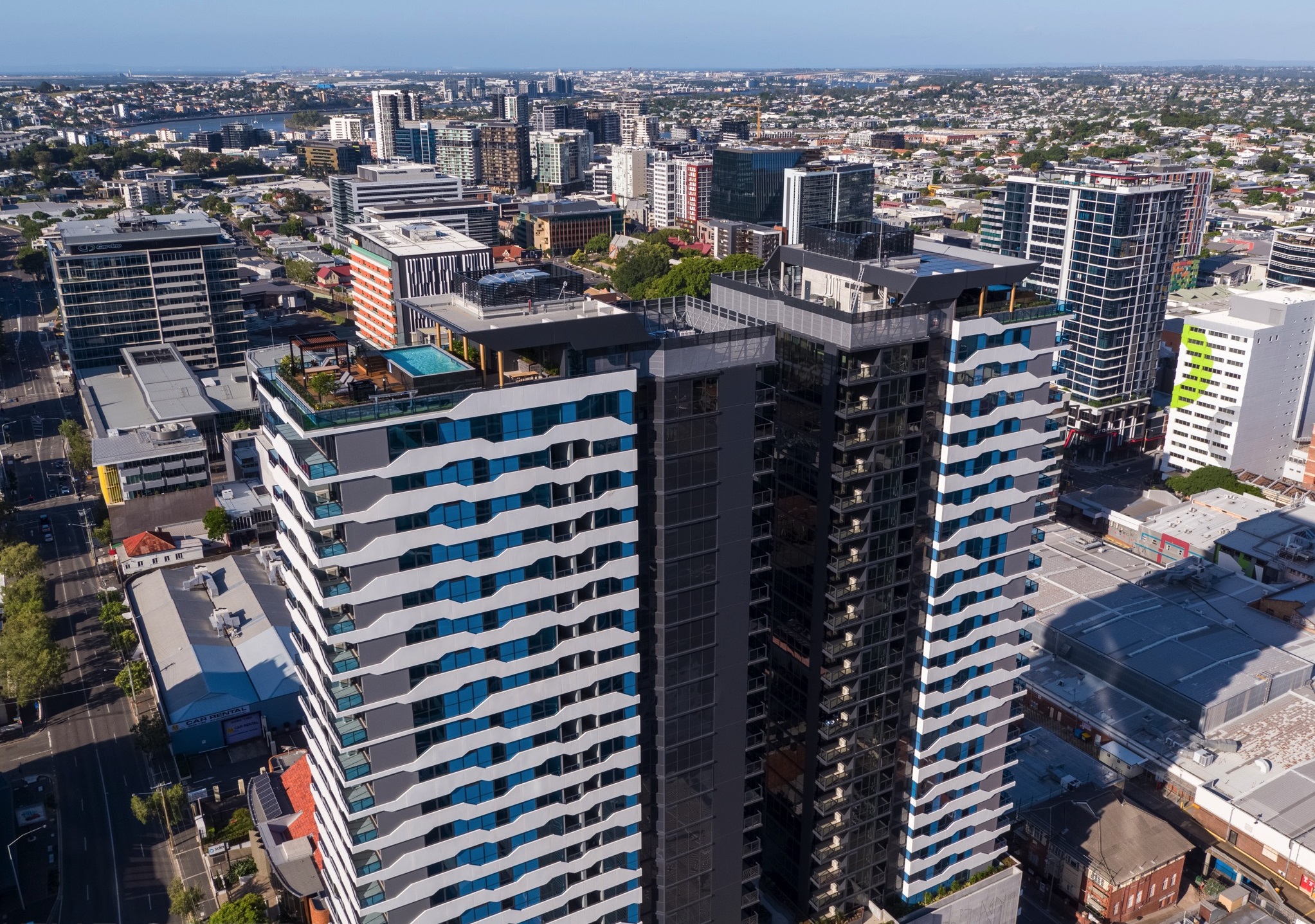

The Urban Developer’s latest Brisbane housing market insights reveal that the city’s property prices are now 11 per cent below the record high, which was set in June 2022.
This resource, updated periodically, will collate and examine the economic levers pushing and pulling Brisbane’s housing market.
Combining market research, rolling indices and expert market opinion, this evolving hub will act as a pulse check for those wanting to take a closer look at the movements across the market.
Brisbane median property prices % change
| Type | Month | Quarter | Annual | Median |
|---|---|---|---|---|
| All | -0.4% | -3.2% | -6.8% | $694,495 |
| Houses | -0.4% | -3.7% | -8.6% | $767,781 |
| Units | 0.0% | -0.7% | 3.5% | $490,997 |
^Source: CoreLogic - February 2023
Brisbane homes prices fell 3.2 per cent for the three months to February 2023, against a smaller national decline of 2.3 per cent, CoreLogic reported.
The decline in national home values has been slowing since September last year.
In February Brisbane home values nudged lower 0.4 per cent, adding to the yearly loss totaling 6.8 per cent.
Brisbane home values are now 11 per cent below the record high, which was in June 2022.
Sales volume for Brisbane tanked 23.8 per cent for the year to February, slightly worse than the 21.2 per cent recorded nationally.
CoreLogic estimates that in the 12 months to February, there were 486,620 sales nationally, down 21.2 per cent compared to the previous year. Monthly sales volumes averaged 37,020 over the past six months, down from an average of 40,155 over the past five years.
Brisbane median days on market for the quarter to February were 35, compared to 13 for the previous corresponding period and 41 nationally and combined capitals at 37.
Meanwhile, in the three months to February, the national median vendor discounting rate contracted slightly on the three months to January.
The Brisbane vendor discount was 4.2 per cent, expanding from 2.9 per cent for the corresponding period.
Brisbane listings were down 17.1 per cent from the equivalent period last year, compared with a national decline of -15.4 per cent and combined capitals down 15.9 per cent.
In other reported Brisbane housing news…
⬛ The median value for a home is above $1 million in 40 of the 338 Brisbane suburbs CoreLogic analysed, which is down from 65 suburbs in 2022. [ABC News]
⬛ In the Brisbane suburb of Meadowbrook houses were on the market for just 10 days before being bought. [News.com.au]
⬛ Brisbane was revealed as one of the world’s least affordable cities to buy a home, with ownership now more achievable in places such as Glasgow, Calgary, Liverpool, Sacramento, New York and Las Vegas. [Courier-Mail]
⬛ The median price of a house in Brisbane has slightly surpassed $800,000, which is more than $200,000 lower than Melbourne’s median of $1.032 million and $612,000 less than Sydney’s median of $1.414 million. [Domain]
Brisbane’s housing market: policy updates and trends
Queensland Caps Rent Increases
Rent rises would be limited to once a year instead of every six months, and additional funding measures would be put in place to help those facing homelessness and housing stress. Queensland announced. This included $28 million for emergency hotel accommodation, rental and bond support payments, and food relief services, as well as $3.9 million to extend and expand food and emergency relief support until 2024.
Brisbane Council Smooths Way for Build-to-Rent
Brisbane City Council has increased building heights for South Brisbane’s Kurilpa Precinct to match the CBD’s 90-storey Skytower. This move aims to provide 10,000 more homes as part of the council’s Sustainable Growth Strategy, led by Lord Mayor Adrian Schrinner's “anti-sprawl approach to housing”.
Affordable Residential Block Tweaked for Brisbane Suburb
Brisbane Housing Company plans an affordable 34-unit development at Chermside with state government support. Updated proposals simplify the design, reducing the roof garden for improved amenity. BHC acquired the site in January 2022, located 10km from the CBD, between a six-storey building and low-density residential housing.
Cycling Park on Track for Brisbane Olympics
Work has begun on the $35 million Brisbane International Cycle Park, an international-standard cycling facility at Murarrie, just 8km from The Gabba. The park, which is part of Brisbane’s Olympic legacy projects, will include a major renovation of the existing 1.4km Murarrie Recreation Reserve cycling track and clubhouse. It will serve as a significant training facility leading up to and during the 2032 Games, and beyond.
Council Takes Cut of Ex-ABC HQ Site for Green Bridge
Brisbane City Council will resume 2217sq m of land on the former ABC site in Toowong from Consolidated Properties Group, which is developing the $400-million Monarch two-tower riverfront apartment project at the site. Lord Mayor Adrian Schrinner said the resumption was necessary to secure the Toowong to West End Green Bridge’s future construction.
Approval Fast-Tracks 13,000 Homes at Caboolture West
The Caboolture West Interim Structure Plan will speed up assessment and approval of 13,000 homes in one of Queensland’s largest greenfield growth areas. This plan sets the stage for the creation of a new suburb, which is expected to become the Sunshine State’s fourth-largest city with 30,000 new homes and a community of at least 70,000 people over the next four decades. The plan earmarks 600ha of land for new housing in the first stage, as the Queensland government works to alleviate the state's critical housing shortage.
Moreton Bay Waives Fees to Boost Affordable Housing
Moreton Bay Regional Council has waived development fees to encourage private development of affordable housing, becoming the first council in Queensland to do so as part of the state's $2-billion housing investment fund. Mayor Peter Flannery said the move sent a message to developers that the region was open for business and willing to work with them, having already cut red tape.
What the experts are saying about Brisbane’s housing market
Tim Lawless
Head of Research
Corelogic
“Once we see a widespread belief that rates have peaked, that is when we are likely to see consumer sentiment improve alongside more housing activity, both from a buying and selling perspective.
“We aren’t likely to see any material rise in housing values until interest rates reduce or another form of stimulus returns to the market, such as a loosening in credit policy.”

Shane Oliver
Chief Economist
AMP Capital
“Interest rates are still a lot higher than they were a year ago and people’s borrowing capacity is substantially lower than last year, so it still points to more downside in prices.
“But I’d be the first to concede that the property market does surprise on the upside at times.
“And you can’t rule out the possibility that we may have seen the bottom, or we may be close to it.”

Nicola Powell
Chief of Economics and Research
Domain
“It will still be a little while before we see the true impact of higher interest rates on mortgage holders with the Commonwealth Bank reporting that it takes banks on average, three months to pass on the RBA’s cash rate increases to borrowers’ minimum monthly repayments.
“According to the RBA, 35 per cent of outstanding housing credit is on fixed-rate terms, with about two-thirds of these loans due to expire by the end of 2023.
“As more borrowers become exposed to higher repayments it does present a risk of higher levels of mortgage stress and therefore distressed listings.”

Louis Christopher
Managing director
SQM Research
“Despite the housing downturn, there remains a distinct lack of intent by many sellers to come to market and to meet the market.
“This clearly reveals itself by the lower-than-average counts of new stock entering the market for February.
“Vendors are not willing to negotiate downwards as shown in our asking prices, which are essentially flat despite the sharp fall in sale prices.”
Brisbane auction clearance rates
| Week | Clearance rate | Auctions/Sold | Total sales |
|---|---|---|---|
| Ending 4 February 2023 | 46% | 48 / 22 | $12,197,000 |
| Ending 11 February 2023 | 47% | 53/ 25 | $20,714,500 |
| Ending 18 February 2023 | 58% | 57 / 33 | $30,328,388 |
| Ending 25 February 2023 | 46% | 70 / 32 | $23,485,000 |
^Source: Domain - February 2023
In February, Brisbane witnessed a surge in its auction clearance rate, which was the highest recorded since May 2022, Domain reported.
Despite this, the Queensland capital has chalked up a decline in its annual clearance rate, which ranked it the weakest among all the state capitals.
This drop was blamed on the strong property market in 2021, which resulted in abnormally high clearance rates.
Additionally, Brisbane’s property market is less keen on auctions, making it prone to greater fluctuations in clearance rates.
Clearance rates across the combined capitals increased, marking the highest clearance rate since February 2022, Domain reported.
The improvement can be attributed to the relatively subdued auction market in January.
However, it was unlikely auction volumes would grow much during the autumn selling season as sellers seemed to be adopting a wait-and-see approach to gauge the direction of the property market in 2023, Domain said.
Meanwhile, Brisbane’s auction house median price declined in February, in contrast to most state capitals that recorded an increase.
Brisbane residential rental vacancy rate
| City | Vacancy rate | Monthly % change | Vacancies | Net change |
|---|---|---|---|---|
| Brisbane | 0.8% | Steady | 2802 | 43▼ |
^Source: SQM Research - February 2023
Brisbane’s rental market remained steady, with rental vacancy rates holding at 0.8 per cent in February 2023, SQM Research has reported.
This figure is in line with the steady national rental vacancy rate of 1 per cent, which saw a slight rise of 448 homes to a total of 32,040 residential properties across Australia.
Rental vacancy rates were also steady in Sydney and Adelaide at 1.3 per cent and 0.5 per cent respectively.
The tightest rental market was Perth, with a vacancy rate of just 0.4 per cent.
However, rental vacancy rates in the CBDs of Brisbane, Sydney, Melbourne, and Brisbane decreased sharply to 1.2 per cent, 2.6 per cent, 2.2 per cent, respectively, most likely reflecting the sudden surge in demand from international students.
The tight rental conditions persisted due to a surge in net overseas arrivals relative to new residential property supply, SQM Research said.
Brisbane rent prices
| Type | Rent | Monthly % change | Annual % change |
|---|---|---|---|
| Houses | $669.31▲ | 0.7%▲ | 16.7%▲ |
| Units | $498.41▲ | 3.9%▲ | 27.1%▲ |
^Source: SQM Research - Week ending March 20, 2023
Meanwhile, according to CoreLogic in their Hedonic Home Value Index for February, Brisbane’s house rents surged 11.9 per cent for the year, while unit rents gained 15.6 per cent.
Gross rental yields for Brisbane were 4.3 per cent in February.
SQM managing director Louis Christopher said: “We still remain very concerned for the situation in Melbourne, Sydney and Brisbane we are most international arrivals first land.”
Queensland building approvals
| Dwelling | Approved | Monthly % change |
|---|---|---|
| Houses | 1406 | -16.6% |
| All dwellings | 3525 | 25.6 |
^Source: Australian Bureau of Statistics - December 2023
Queensland was the only state to record an increase in total home approvals in January, according to the latest Australian Bureau of Statistics figures, which show a 25.6 per cent jump, driven by new apartment developments.
The total number of homes approved across Australia fell 27.6 per cent (seasonally adjusted) in January, with NSW (-49.0 per cent) and Victoria (-38.6 per cent) experiencing the largest declines.
Tasmania (-31.7 per cent), Western Australia (-7.9 per cent), and South Australia (-6.5 per cent) also recorded decreases.
The ABS head of construction statistics, Daniel Rossi, said approvals for private sector houses fell by 13.8 per cent, marking the fifth consecutive drop and the lowest result recorded since June 2012.
Approvals for private sector houses fell in all states, including Queensland (-16.6 per cent), Western Australia (-18.7 per cent), NSW (-17.3 per cent), Victoria (-9.9 per cent), and South Australia (-2.8 per cent).
The more volatile private sector homes, excluding houses series, fell 40.8 per cent in January, following a 41.9 per cent rise in December.
The value of total building approvals fell 18.6 per cent, while the value of total residential building approvals fell 13.6 per cent, comprised of a 15.1 per cent decrease in new residential building and a 4 per cent fall in alterations and additions.
The value of non-residential building approved decreased 25.6 per cent, following a 1.6 per cent fall in December.

Queensland home loan lending indicators
| Type | Lending ($bn) | Monthly % change |
|---|---|---|
| New loan commitments for owner-occupier housing | 2.992 | -4.8▼ |
| New loan commitments for investor housing | 1.515 | -5.13▼ |
^Source: Australian Bureau of Statistics - January 2023
New loan commitments in Queensland for owner-occupier first-home buyers fell 8.9 per cent in January, the latest Australian Bureau of Statistics figures show.
The Queensland decline for first-home buyers exceeded the national fall of 8.1 per cent, which worsened from a 4.1 per cent dip in December.
Queensland fared better than Victoria (-11.5 per cent) and NSW (-27.5) while WA retreated 3.7 per cent, Tasmania 8.4 per cent and South Australia edged down 1.5 per cent.
The national reading came in 57.5 per cent below the high hit in January 2021 and 25.5 per cent lower than the pre-pandemic peak in February 2020, the bureau reported.
The number of new first-home buyer loans for January 2021 in Queensland was 3524, well above the latest January 2023 result of 1462.
The peak prior to January 2021 was 3572 in May 2009.
The number of new owner-occupiers first-home buyer loan commitments nationally fell to the lowest level since February 2017, the bureau said.
ABS head of finance and wealth statistics Mish Tan said the decline coincided with the winding down of Covid-19 pandemic stimulus measures.
“Anecdotal feedback from lenders suggested that reduced borrowing capacity due to rising interest rates further dampened overall demand for new housing loans in recent months.”
The overall value of new loan commitments for housing fell 5.3 per cent to $22.1 billion in January 2023. The value of total new owner-occupier loan commitments fell 4.9 per cent to $14.7 billion, while new investor loan commitments fell 6 per cent to $7.4 billion.
In Queensland, new loan commitments for housing gave up 3.5 per cent to $2.874 billion and new investor loan commitments slipped 4.9 per cent to $1.436 billion.
*This post was originally published on https://www.theurbandeveloper.com/articles/brisbane-housing-market-update




